NEW DELHI: Days after Modi government notified the Citizenship Amendment Act (CAA) rules, Shaheen Bagh — the epicentre of 2020 protests — again witnessed a surge of women and men arriving in streets on Monday and Tuesday to express dissent on the move that will affect the six persecuted minorities — Hindus, Sikhs, Buddhists, Christians, Jains and Parsis from three nations.
Speaking with the The New Indian, Kaneez Fatima, a 48-year-old resident of Shaheen Bagh, dissed CAA, saying this would further compound population problem in a country that has already seen a surge during the last decade, touching the 140.76 crore mark last year.
“Muslims don’t require the CAA. They are content in their own countries and rarely leave to seek refuge elsewhere. The government should send the refugees back. Our country already has a big population and more people might lead to more unemployment,” said Fatima, a 50-year-old activist.
“India’s current economic woes, including bankruptcy and unemployment, raise questions about the timing and rationale behind granting citizenship without apparent benefits to the nation,” she added.
Another woman, Nusrat, claimed that Delhi Police cops have been visiting homes of several Shaheen Bagh activists, desisting them from making public appearances and inciting others against CAA.
READ MORE : Delhi: Civic Body Halts Demolition Drive In Shaheen Bagh After Protest
“My father is a cancer patient. Delhi Police have been knocking at my doors,” said
In 2020, Shaheen Bagh, a south east Delhi mofussil area was bombarded with protests where septuagenarians, octogenarians and nonagenarians among burqa-clad women, largely comprising minority, in the neighbourhood of Jamia Millia Islamia (JMI) had collected inside the make-shift tents to protest against the CAA.
Mohammad Yakoob Nuri, another local, said, “CAA disrupts our nation’s harmony and seems designed to divide us. Everyone must unite in opposition to this act. The demand for documents like birth certificates, which many lack, is unfair and discriminatory,” he stated, while drawing ambiguous parallel between NRC and CAA.
There were those who expressed anxiety over unemployment while pinning blame on the CAA to provide shelter to immigrants.
“The current administration’s policies have made us feel like we’ve gone back in time. The unfair treatment Muslims are experiencing is very clear, and it’s causing a lot of distress. The cost of marrying off my two daughters is adding to our financial difficulties,” said a man, wishing anonymity, adding “ he had no money to marry his daughter while seeking a job for his son too. Despite their education, my family is struggling financially,”
Separately, JMI, led by its students, also held a demonstration on Tuesday against the CAA while several women from Shaheen Bagh are also holding protests at Jantar Mantar since the notification of CAA rules.










